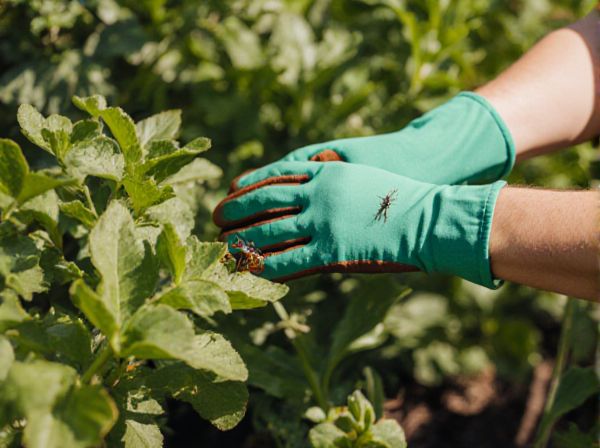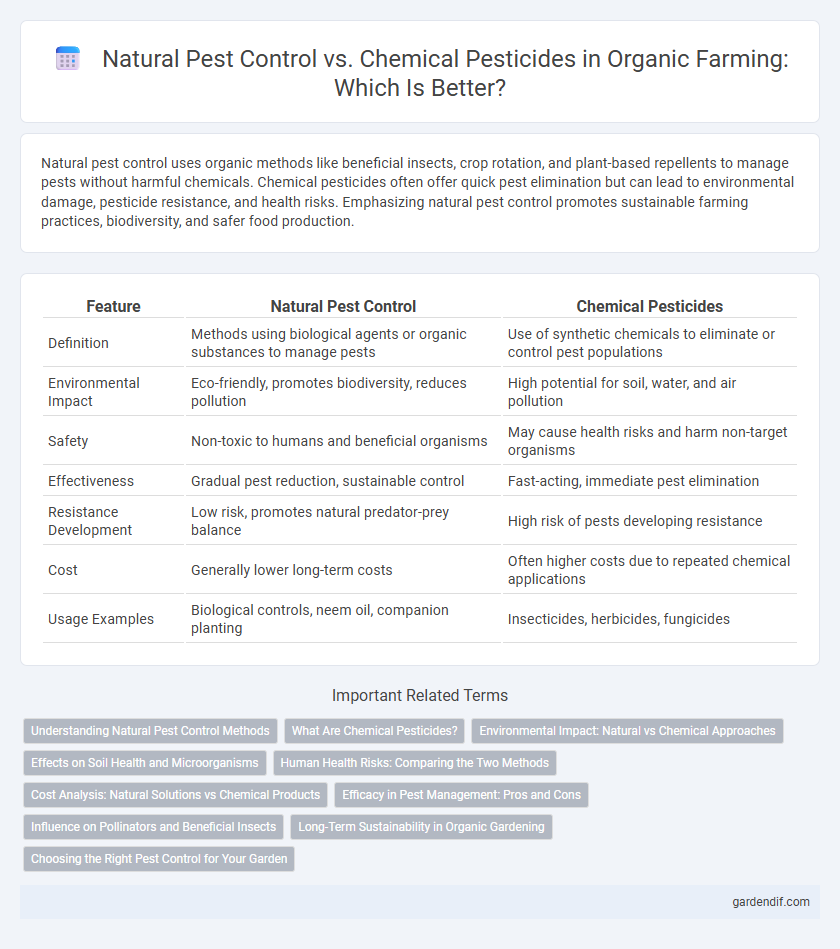
Natural pest control vs Chemical pesticides Illustration
Natural pest control uses organic methods like beneficial insects, crop rotation, and plant-based repellents to manage pests without harmful chemicals. Chemical pesticides often offer quick pest elimination but can lead to environmental damage, pesticide resistance, and health risks. Emphasizing natural pest control promotes sustainable farming practices, biodiversity, and safer food production.
Table of Comparison
| Feature | Natural Pest Control | Chemical Pesticides |
|---|---|---|
| Definition | Methods using biological agents or organic substances to manage pests | Use of synthetic chemicals to eliminate or control pest populations |
| Environmental Impact | Eco-friendly, promotes biodiversity, reduces pollution | High potential for soil, water, and air pollution |
| Safety | Non-toxic to humans and beneficial organisms | May cause health risks and harm non-target organisms |
| Effectiveness | Gradual pest reduction, sustainable control | Fast-acting, immediate pest elimination |
| Resistance Development | Low risk, promotes natural predator-prey balance | High risk of pests developing resistance |
| Cost | Generally lower long-term costs | Often higher costs due to repeated chemical applications |
| Usage Examples | Biological controls, neem oil, companion planting | Insecticides, herbicides, fungicides |
Understanding Natural Pest Control Methods
Natural pest control methods utilize biological agents such as beneficial insects, like ladybugs and predatory mites, to manage pest populations without harmful chemicals. These approaches enhance ecosystem balance, promoting long-term pest resistance and soil health by avoiding synthetic pesticide residues. Understanding natural pest control emphasizes integrating crop rotation, companion planting, and organic mulches to reduce pest habitats and strengthen plant immunity.
What Are Chemical Pesticides?
Chemical pesticides are synthetic substances designed to eliminate or control pests, including insects, weeds, fungi, and rodents, often used in conventional farming to protect crops and increase yields. These pesticides can include insecticides, herbicides, fungicides, and rodenticides, which may pose risks to human health, beneficial organisms, and the environment due to their toxicity and persistence. Natural pest control methods offer an alternative by utilizing biological agents, organic compounds, and ecological practices to manage pests sustainably without harmful chemical residues.
Environmental Impact: Natural vs Chemical Approaches
Natural pest control methods minimize environmental damage by promoting biodiversity and enhancing soil health, reducing chemical runoff into water sources. Chemical pesticides often lead to contamination of ecosystems, harming beneficial insects, wildlife, and causing soil degradation. Sustainable organic practices prioritize ecological balance and long-term environmental preservation over short-term pest eradication.
Effects on Soil Health and Microorganisms
Natural pest control enhances soil health by preserving beneficial microorganisms essential for nutrient cycling and soil structure. Chemical pesticides often disrupt these microbial communities, leading to reduced soil fertility and imbalance in ecosystem functions. Maintaining healthy soil microbiota through organic methods supports sustainable agriculture and long-term productivity.
Human Health Risks: Comparing the Two Methods
Natural pest control methods minimize human health risks by avoiding toxic chemicals that can cause respiratory problems, skin irritation, and long-term illnesses. Chemical pesticides often contain harmful substances linked to neurological disorders, cancer, and endocrine disruption in exposed individuals. Choosing natural pest control supports safer environments for families, agricultural workers, and consumers by reducing exposure to hazardous compounds.
Cost Analysis: Natural Solutions vs Chemical Products
Natural pest control methods often incur lower long-term costs due to reduced need for repeated applications and minimal environmental damage. Chemical pesticides may provide quicker results but can lead to higher expenses stemming from health risks, environmental cleanup, and pest resistance. Investing in organic solutions typically ensures sustainable pest management with cost benefits that outweigh the initial price gap.
Efficacy in Pest Management: Pros and Cons
Natural pest control methods rely on biological agents and organic substances to manage pests, offering sustainable and eco-friendly advantages by minimizing chemical residues and resistance buildup. Chemical pesticides provide rapid and highly effective pest elimination but often lead to environmental contamination, non-target species harm, and potential human health risks. Balancing efficacy with environmental and health considerations is crucial for integrated pest management strategies.
Influence on Pollinators and Beneficial Insects
Natural pest control methods protect pollinators and beneficial insects by avoiding harmful chemicals that disrupt their habitats and reproductive cycles. Chemical pesticides often cause significant declines in bee populations and beneficial insect diversity due to toxin exposure and bioaccumulation. Using organic pest management enhances ecosystem health by preserving crucial insect pollinators and natural predators essential for sustainable agriculture.
Long-Term Sustainability in Organic Gardening
Natural pest control in organic gardening promotes long-term sustainability by enhancing soil health and preserving beneficial insect populations critical for ecosystem balance. Chemical pesticides often disrupt these biological systems, leading to pesticide resistance and reduced biodiversity over time. Emphasizing organic methods supports resilient crop production and safeguards environmental integrity for future growing seasons.
Choosing the Right Pest Control for Your Garden
Natural pest control methods use beneficial insects, companion planting, and organic sprays to maintain garden health without harming the environment. Chemical pesticides offer fast and effective pest elimination but can lead to soil degradation, resistance buildup, and harm to beneficial organisms. Selecting the right pest control depends on garden size, pest severity, and commitment to sustainability, with natural options favored for long-term ecological balance.
Natural pest control vs Chemical pesticides Infographic

 gardendif.com
gardendif.com